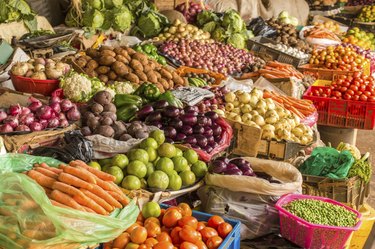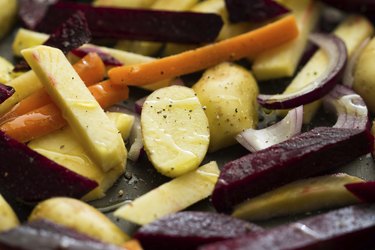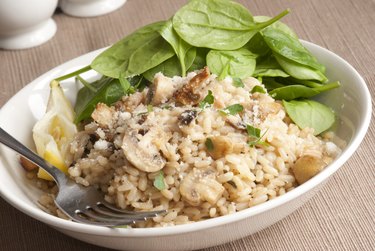
A fruit and vegetable diet may not always focus exclusively on those two food groups, but it does use them to make up the majority of what you eat every day. While there are plenty of advantages to eating a lot of fruits and vegetables, gaining weight is not one of them, unless you've been instructed to gain weight by your doctor. Although it's possible to gain weight on such a limited diet, it isn't easy.
Weight Maintenance
Video of the Day

A lot of factors help determine whether or not you gain weight on a specific diet and how quickly you put on a few pounds. Your body size, rate of metabolism and level of physical activity all make a difference, but the most important factor is how many calories you burn and consume each day. To gain weight on a fruit and vegetable diet, you must consistently eat more calories than you burn, which can be difficult because most fruits and veggies are low in calories and high in fiber, a particularly satiating nutrient.
Video of the Day
Benefits of Fruit and Vegetable Intake

If you can manage to gain weight on such a specific diet plan, one of the primary reasons is probably that fruits and vegetables are high in carbohydrates. Since most fruits and veggies are fat-free, you won't be adding fat to your diet. ChooseMyPlate.gov notes that fruits and vegetables contain essential vitamins and minerals that can help you reduce your risk of cancer, bone loss, stroke, kidney stones, diabetes and heart attack.
Nutrition Facts

According to the U.S. Department of Agriculture, a medium baked potato with flesh and skin has about 160 calories. A whole avocado has about 320, making it one of the most calorie-rich choices you can get. In contrast, a medium apple has about 95 calories, a cup of strawberries has only about 55 calories, a cup of broccoli has about 30 and a cup of raw spinach has just 7 calories.
Meal Accompaniments

You might find it easier to gain weight while following a fruit and vegetable diet if you use a lot of accompaniments or add-ons with your food. Eating fruit with whipped cream or whole milk yogurt, for example, can add hundreds of calories and several fat grams per serving. You can also try sautéing vegetables in olive oil or coconut oil and serving them with a nutritious, higher-calorie side, such as brown rice or whole wheat bread.
Points to Consider

Regardless of whether you're trying to gain or lose weight, following an all-fruit-and-veggie diet is not the healthiest way to do it. Such a limited eating plan is classified as a fad diet because it excludes major food groups and focuses too heavily on just a few types of food. Following a fruit and vegetable diet for more than a few days isn't likely to meet your daily protein and fat recommendations and may lead to nutrient deficiencies, fatigue, dizziness or other health issues. Before you make any major changes to your eating plan, get your doctor's approval.
- ChooseMyPlate.gov: Why Is It Important to Eat Vegetables?
- Weight Control Information Network: Weight-Loss and Nutrition Myths
- USDA National Nutrient Database: Avocado, Raw
- USDA National Nutrient Database: Potato, Baked, Flesh and Skin, Without Salt
- USDA National Nutrient Database: Apple, Raw
- USDA National Nutrient Database: Strawberries, Raw
- USDA National Nutrient Database: Broccoli, Cooked, Boiled, Drained
- USDA National Nutrient Database: Spinach, Raw